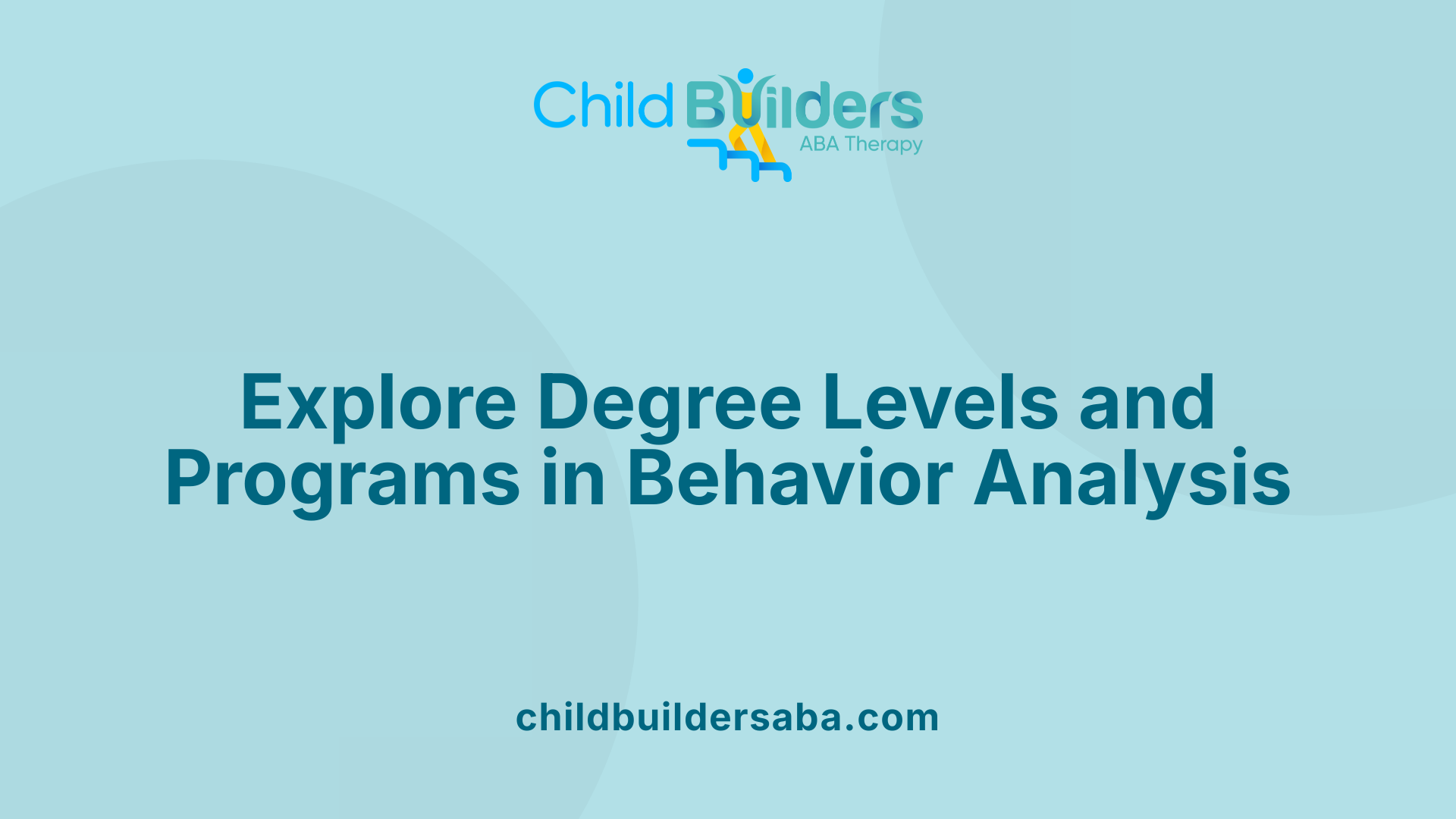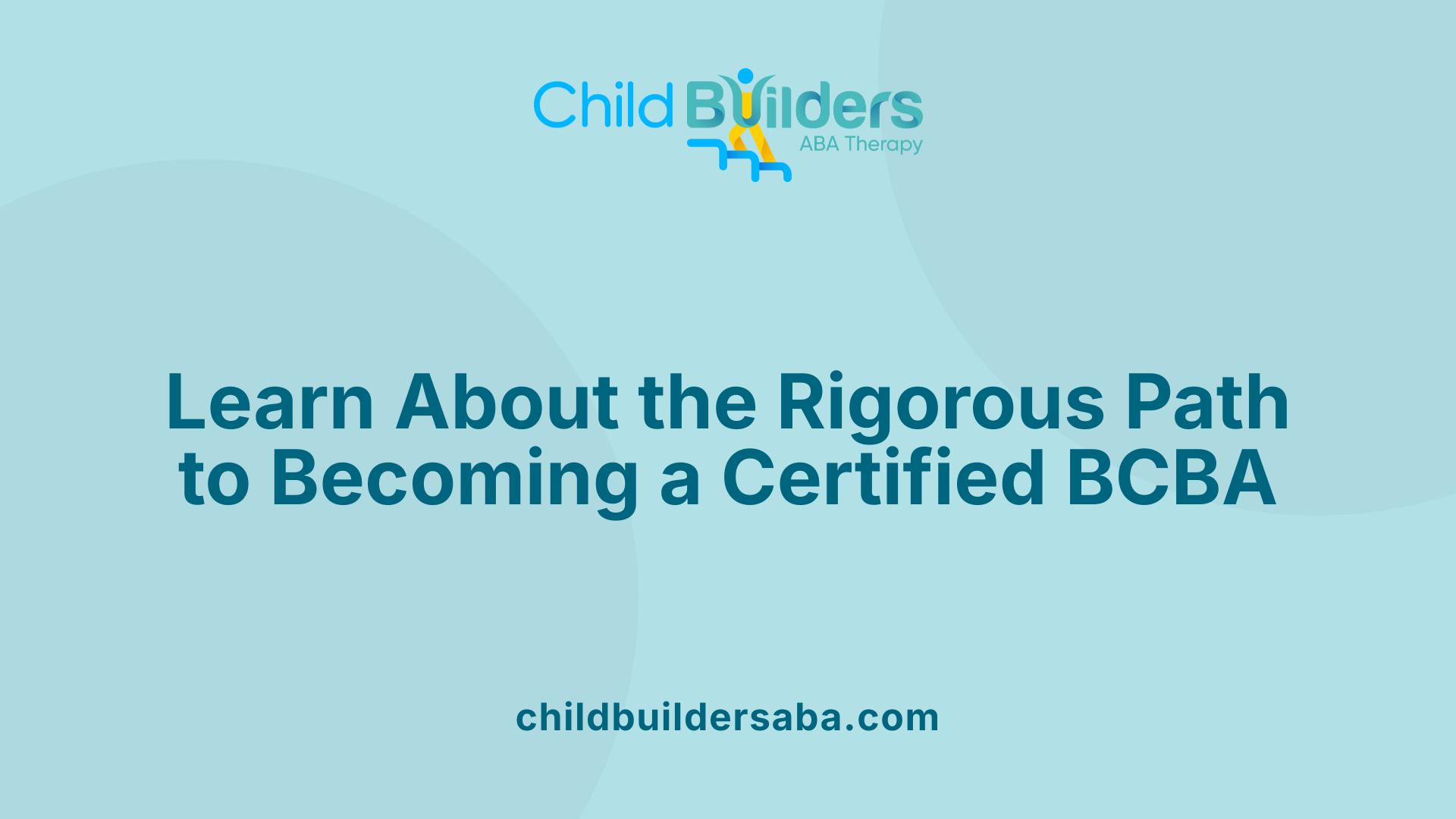BCBA Programs & Schools

Understanding the Journey to Become a BCBA
For individuals passionate about improving lives through behavior analysis, becoming a Board Certified Behavior Analyst (BCBA) involves a structured educational path, rigorous training, and certification compliance. This overview details accredited programs, degree requirements, and certification standards to guide prospective students on their journey into this rewarding profession.
Accredited BCBA and Behavior Analysis Programs Across the U.S.

Which universities offer ABAI-accredited programs?
There are numerous universities across the United States that provide ABAI-accredited programs at various levels. The website lists 57 institutions, offering undergraduate, graduate, and doctoral programs focused on behavior analysis. Notable examples include The Chicago School, Mercy University, Hunter College, Marquette University, and the University of Wisconsin system.
These universities are recognized for meeting stringent standards set by the Association for Behavior Analysis International (ABAI), ensuring their programs align with current professional and scientific benchmarks for behavior analysis.
What levels of education are available in behavior analysis?
Students interested in behavior analysis can pursue a variety of degree options. These include:
- Bachelor’s Degrees: Often offered as major programs, minors, or certificates. These foundational programs introduce students to core concepts like reinforcement, behavior assessment, and behavioral interventions.
- Master’s Degrees: Designed to prepare students for BCBA certification, these programs typically include coursework, supervised practicum hours, and research opportunities.
- Doctoral Programs: Focused on advanced research and clinical practice, these programs train students in scientific methodologies and innovative intervention techniques.
Many programs also offer flexible learning formats such as online, in-person, or hybrid courses, making education accessible to diverse student populations.
How does the accreditation process enhance program quality?
The accreditation process for ABA programs involves a rigorous review to ensure quality, consistency, and adherence to professional standards. The process includes several stages:
| Accreditation Stage | Description | Purpose |
|---|---|---|
| Eligibility Request | Schools declare intent to pursue accreditation, submitting initial documentation. | Indicates readiness for review. |
| Initial Accreditation | Schools undergo a comprehensive review of curriculum, faculty, and practicum offerings. | Validates program quality at launch. |
| Re-Accreditation | Schools undergo periodic review to maintain accreditation status. | Ensures ongoing compliance and improvement. |
Maintaining accreditation ensures that programs meet the standards necessary for students to qualify for BCBA and BCaBA certification, and provides transparency for prospective students assessing their educational options.
What coursework and practical experience are required?
Most ABAI-accredited programs include coursework in four key domains: Theory and Philosophy, Experimental Analysis, Applied Behavior Analysis, and Service Delivery. These courses often cover:
- Basic principles of behavior
- Ethical practices
- Data collection and analysis
- Behavior assessment and intervention
Practicum or fieldwork is an integral part of these programs. It offers supervised hands-on experience, helping students develop real-world skills and meet certification requirements.
Program options available for aspiring BCBAs
| Program Type | Credits/Hours | Features | Example Institutions |
|---|---|---|---|
| Undergraduate Degree | Varies (Typically 120+ credits) | Basic ABA knowledge, prerequisites for graduate programs | Various U.S. universities |
| Master’s Degree in ABA | 30–55 credits; includes 150–2000 supervised hours | Focused training in applied behavior analysis, practicum included | Hunter College, Mercy University, Florida Tech |
| Doctoral Programs | 70+ credits including research and practicum | Advanced research, leadership training, clinical expertise | Several universities including Arizona State University |
Overall, these programs are designed to prepare students for certification exams and professional practice, enabling them to serve diverse populations including individuals with autism, developmental disabilities, and other behavioral challenges.
How are programs evolving?
The landscape of ABA education is dynamic, with notable transitions like the phase-out of the Verified Course Sequence (VCS) system by January 2027. Schools are increasingly pursuing ABAI accreditation to demonstrate compliance with the latest standards, ensuring their curricula remain relevant and comprehensive.
In conclusion, prospective students seeking to enter the field of behavior analysis should prioritize programs that are ABAI-accredited. These programs not only prepare students for certification but also uphold the scientific integrity and ethical standards crucial to effective practice.
| Key Features | Program Details | Notable Examples |
|---|---|---|
| Accreditation Standards | ABAI-Accredited, Verified Course Sequence (VCS transitional) | Chicago School, Mercy University, Hunter College |
| Degree Levels | Bachelor’s, Master’s, Doctoral | Various universities listed above |
| Practical Training | Supervised practicum included | All accredited programs |
Degrees, Coursework, and Certification Requirements

What degrees and coursework are needed to qualify for the BCBA certification?
To become a Board Certified Behavior Analyst (BCBA), candidates are generally required to earn a graduate degree, such as a master's in psychology, education, or applied behavior analysis, from an accredited program. These programs must meet standards set by the Behavior Analyst Certification Board (BACB) or be recognized as ABAI-accredited or include a Verified Course Sequence (VCS).
The coursework component covers essential topics like behavior analysis principles, ethics, research design, data collection, and intervention strategies. Complementing the academic requirements, candidates must complete between 1,500 and 2,000 hours of practical, supervised fieldwork under the guidance of a qualified BCBA. This hands-on experience solidifies theoretical knowledge through real-world application.
Once educational and experiential requirements are satisfied, applicants sit for a certification exam that includes 160 or 185 multiple-choice questions, administered at Pearson VUE testing centers. Successful candidates are awarded the BCBA credential, enabling them to provide independent behavioral services.
Maintaining the BCBA certification involves earning continuing education credits, adhering to ethical guidelines, and completing recertification every two years. This ongoing process ensures practitioners stay current with evolving standards in behavior analysis.
Online Programs and Flexibility in Certification Preparation
Are there online or accredited BCBA programs available?
There are now numerous online programs that prepare students for BCBA certification, many of which are accredited or verified by recognized organizations. Purdue Global University offers a fully online Master of Science in Applied Behavior Analysis, designed to meet the coursework standards required by the BACB by 2027. This program not only emphasizes core ABA principles but also includes practical experience options to ensure real-world application, resulting in a high pass rate for the BCBA exam.
Ball State University provides an entirely online Master’s in Applied Behavior Analysis, verified by the Behavior Analysis International (BAAI). This program specializes in autism and related behavioral fields, offering affordable tuition options for students seeking flexibility. The University of Utah has an online M.Ed. in Special Education with a focus on ABA, fully supporting BCBA certification preparation. It boasts impressive exam pass rates, reflecting its quality and alignment with certification standards.
All these programs are strategically aligned with BCBA guidelines, either accredited or verified, and are designed specifically to accommodate the schedules of working professionals seeking to advance their careers in behavior analysis.
What is the typical timeline and fastest pathway to becoming a BCBA?
The pathway to becoming a BCBA generally takes around 2.5 to 3 years, depending on the individual’s pace and program structure. It typically begins with earning a master’s degree in behavior analysis or a related area, a process that usually lasts 1.5 to 2 years full-time.
During or shortly after completing the academic coursework, candidates are required to gather between 1,500 to 2,000 hours of supervised fieldwork, a process that spans approximately 9 to 12 months. This hands-on experience is essential for practical skill development and is often integrated into the program curriculum.
Once educational and experiential requirements are met, candidates proceed to prepare for the BACB certification exam. The exam preparation, including review and practice, generally takes 2 to 3 months. Upon passing the exam, individuals are officially certified as BCBAs.
Following certification, many choose to pursue state licensure where applicable, and must engage in ongoing continuing education to maintain their certification. This structured pathway ensures that aspiring professionals are thoroughly prepared for the responsibilities and challenges of practice in various settings, from clinics to schools.
| Program Type | Delivery Mode | Accreditation/Verification | Focus Area | Key Features |
|---|---|---|---|---|
| Purdue Global MS | Online | BACB Standards, meets 2027 requirements | Applied Behavior Analysis | Practical experience, high pass rate |
| Ball State MS | Fully online | Verified by BAAI | Autism and related fields | Affordable tuition |
| University of Utah M.Ed. | Online | Meets certification guidelines | Special Education with ABA focus | High exam pass rates |
This table summarizes important aspects of various online BCBA preparation programs, making it easier for prospective students to compare options based on their needs and schedules.
Cost Considerations and Program Affordability
What are the costs associated with BCBA programs, and which are the most affordable options?
The expense of becoming a Certified Behavior Analyst (BCBA) varies based on the institution, program level, and delivery format. Online programs tend to be more budget-friendly, offering flexibility along with competitive tuition rates. Many ABA master’s programs listed across different universities have tuition fees per credit that hover around $800 to $900, with some falling below these figures.
For example, Ball State University’s online ABA Master’s program is notably affordable, costing under $16,000 for in-state residents and under $23,000 for out-of-state students. Other reasonably priced options include programs from the University of South Florida and Purdue Global, both of which maintain ABIA accreditation while providing competitive tuition rates.
Students should take into account not only tuition but also the program duration, how many credits are required, and additional costs such as practicum fees or materials. Comparing these elements helps in selecting an affordable yet high-quality program.
How do I find suitable BCBA programs and schools?
Finding the right BCBA program involves researching accredited and recognized institutions that meet certifying bodies' standards. A good starting point is the list of universities offering programs that are either accredited by ABAI or verified by the BACB for coursework requirements.
Key aspects to consider include the program’s inclusion of all necessary coursework, supervised practical experiences, and whether the courses are part of a verified course sequence. Many respected universities, such as Northern Kentucky University, University of Kentucky, and Eastern Kentucky University, offer online, in-person, or hybrid degrees designed to prepare students for the BCBA exam.
It is also beneficial to review the delivery method—whether fully online or blended—as well as admission prerequisites like undergraduate GPA or related experience. Confirming all these details ensures the program aligns with your career ambitions and fulfills credentialing prerequisites.
Lastly, utilize comparison searches with queries like 'Affordable and accredited BCBA programs' to identify options that balance cost, quality, and accreditation, helping you make an informed decision.
Career Opportunities and Job Outlook for BCBAs
What career opportunities and job outlook are available for BCBAs?
The field of behavior analysis offers a wide array of career options, reflecting the growing importance of behavioral health interventions across various settings. Board Certified Behavior Analysts (BCBAs) can find employment in educational institutions, clinical practices, hospitals, residential treatment centers, community programs, and organizational management. These roles include direct service providers, clinical supervisors, program directors, and trainers, among others.
The demand for BCBAs is increasing rapidly. Statistics show a growth rate of about 23% from 2021 to 2022, which is significantly higher than the average for most professions in the United States. This rise corresponds with increased awareness of autism spectrum disorder (ASD) and other behavioral challenges requiring specialized intervention. Since 2010, the number of certified behavior analysts has consistently risen each year.
Demand is especially strong for professionals who can provide services to children and adults with autism, developmental disabilities, and other behavioral health issues. Notably, the need extends into various care settings, including special education classrooms, outpatient clinics, behavioral health hospitals, and private practices.
Growth projections and demand for BCBAs
Looking ahead, the job market for BCBAs remains promising. As public and private sectors continue to recognize the effectiveness of applied behavior analysis (ABA), the demand aligns with a broader shift toward evidence-based practices in mental health and developmental services. The number of BCBAs is expected to grow steadily in the coming years, driven by legislative support, insurance coverage expansions, and increasing public understanding.
Specialist roles such as program managers and organizational consultants are also expanding, reflecting the versatility of behavior analysis beyond clinical settings. Moreover, many BCBAs are taking leadership roles in policy development, research, and program implementation.
Salary ranges and earning potentials
Salaries for BCBAs vary depending on factors such as experience, geographic location, work setting, and additional responsibilities. Generally, early-career BCBAs can expect salaries starting from approximately $50,000 per year. With experience and specialization, annual earnings can rise over $80,000, especially in managerial or supervisory roles.
In some cases, BCBAs working in high-demand regions or in private consulting roles can earn even more, with some earning six-figure salaries. Traveling positions or roles with broader administrative responsibilities typically offer higher compensation.
| Experience Level | Typical Salary Range | Potential for Higher Earnings | Notes |
|---|---|---|---|
| Entry-Level (0-2 years) | $50,000 - $65,000 | Limited | Regional variations apply |
| Mid-Career (3-5 years) | $65,000 - $80,000 | Increased | More responsibilities, supervisory roles |
| Experienced/Leadership | $80,000+ | Significant | Management, consulting, private practice |
Overall, the outlook for BCBAs is incredibly positive. Students and professionals entering the field can expect a robust job market with competitive salaries and ample opportunities to make a meaningful impact in people's lives.
Bridging Education and Practice: The Scientist-Practitioner Model

What is involved in the BCBA certification process and standards?
The pathway to becoming a Board Certified Behavior Analyst (BCBA) is comprehensive, emphasizing both coursework and practical experience, rooted firmly in the scientist-practitioner model. Prospective candidates must first complete an approved graduate-level curriculum in behavior analysis. These programs are either accredited by the Association for Behavior Analysis International (ABAI) or include a Verified Course Sequence (VCS) recognized by the Behavior Analyst Certification Board (BACB).
In addition to academic coursework, applicants must fulfill supervised fieldwork requirements, which total either 1,500 or 2,000 hours depending on the pathway chosen. This hands-on training must be conducted under the supervision of qualified professionals to ensure the candidate gains real-world experience in implementing behavioral interventions and assessments.
Once educational and experiential prerequisites are met, candidates submit an online application through the BACB, including official transcripts, documentation of coursework, and supervised experience logs. Upon review and acceptance, they are eligible to sit for the BCBA examination.
The exam itself is a professionally administered, computer-based assessment consisting of multiple-choice questions. It tests knowledge across the BACB Task Lists, covering areas such as behavioral assessment, intervention, ethics, and service delivery. Successful completion results in certification, authorizing the individual to independently practice behavior analysis and supervise other professionals, including Registered Behavior Technicians (RBTs) and Behavior Analyst Certified Assistants (BCaBAs).
Maintaining certification requires ongoing professional development. BCBAs must earn continuing education credits, adhere to ethical standards, and submit periodic renewal applications every two years. The BACB ensures ongoing compliance through regular audits and updates to certification standards.
This certification process embodies the scientist-practitioner model by integrating rigorous academic preparation with real-world application, emphasizing the importance of evidence-based practice, continual learning, and ethical responsibility—or broadly, the commitment to both advancing science and improving lives through behavioral intervention.
Navigating Your Path to Certification and a Career in Behavior Analysis
Embarking on the journey to become a BCBA involves selecting accredited educational programs, fulfilling rigorous coursework and supervised experience requirements, and successfully passing the certification exam. With a growing demand for behavior analysts, career prospects are robust across various settings, offering both professional fulfillment and competitive salaries. Prospective students are encouraged to explore online and in-person options, compare program costs, and verify accreditation to choose the best pathway tailored to their goals. The field of behavior analysis not only promises meaningful work but also contributes significantly to improving the lives of individuals with behavioral and developmental challenges. Staying informed about evolving standards and certification pathways will ensure a successful and rewarding career.
References
- Accredited Programs
- Top 57 Best Schools Offering ABA Bachelor's and BCaBA Courses
- M.S. Applied Behavior Analysis - The Chicago School
- Applied Behavior Analysis (BCBA) Program - Mercy University
- Applied Behavior Analysis - Hunter College - School of Education
- Accredited BCBA Programs in Wisconsin [2025 Guide] - Online ABA ...
- Master of Education in Foundations in Behavior Analysis

























.jpg)











































































